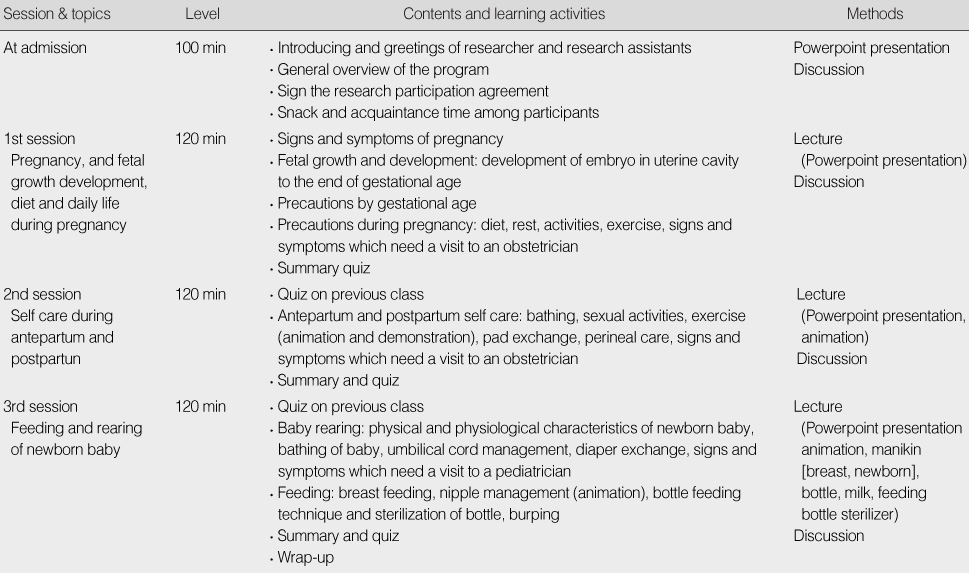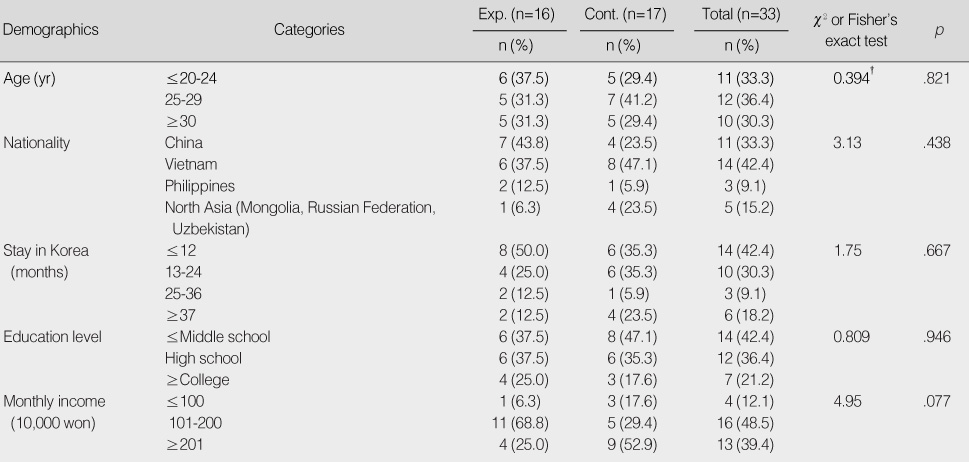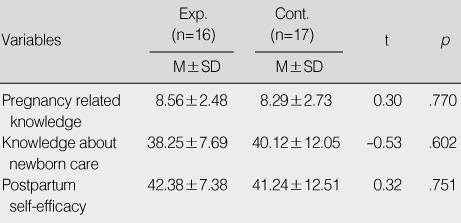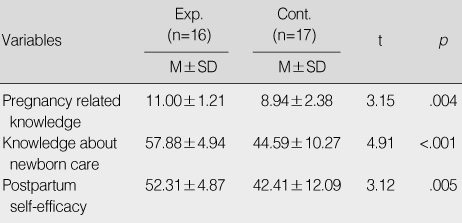Articles
- Page Path
- HOME > J Korean Acad Nurs > Volume 40(1); 2010 > Article
-
Original Article
- Effects of an Educational Program of Pregnancy and Delivery on Pregnancy related Knowledge, Newborn Care Knowledge, and Postpartum Care Self-efficacy of Marriage Immigrant Women
- Eun Hee Kim, Eunjoo Lee, Mi-Jo Kim, Dong Young Park, Sung Hee Lee
-
Journal of Korean Academy of Nursing 2010;40(1):78-87.
DOI: https://doi.org/10.4040/jkan.2010.40.1.78
Published online: February 28, 2010
1Doctoral Student, College of Nursing, Kyungpook National University, Daegu, Korea.
2Associate Professor, College of Nursing, Kyungpook National University, Daegu, Korea.
3Full-time Lecturer, Department of Nursing, Kyungsan University College, Gyeongsan, Korea.
- Address reprint requests to: Lee, Eunjoo. College of Nursing, Kyungpook National University, 101 Dongin-dong, Jung-gu, Daegu 700-422, Korea. Tel: 82-53-420-4934, Fax: 82-53-421-2758, jewelee@knu.ac.kr
Copyright © 2010 Korean Society of Nursing Science
Abstract
-
Purpose
- This study was designed to evaluate the effects of an educational program on pregnancy and delivery including pregnancy related knowledge, newborn care knowledge, and postpartum care self-efficacy for married immigrant women.
-
Methods
- A nonequivalent control group quasi-experimental design was used. The educational program was developed by though an educational need assessment of married immigrant women and an expert opinion. The program was provided for 3 weeks, once a week for two hours. The data were analyzed with SPSS program using Kolmogorov-Smirnov, χ2-test, Fisher's exact test, and t-test.
-
Results
- The program significantly improved pregnancy related knowledge, newborn care knowledge, and postpartum care self-efficacy for the married immigrant women who participated in the program compared to the women who did not.
-
Conclusion
- The results indicate that the educational program has an affirmative effect on pregnancy related knowledge, knowledge of newborn care, and postpartum care self-efficacy in these women. It is suggested, therefore, that the educational program be used to every married immigrant woman at the public health centers or delivery clinics help them to adjust to the childbearing and childrearing experience and this will ultimately enhance the quality of family life of married immigrant women in Korea.
- 1. Ahn YH. Health status and health behavior of immigrant women married to Koreans. Journal of Korean Academy of Public Health Nursing. 2008;22:18–26.
- 2. Bandura A. Social foundation of thought and action: A social cognitive theory. 1986;Englewood Cliffs, NJ, Prentice-Hall.
- 3. Bang KS, Han KJ. A study on the change of primipara's mother-infant interaction by infant's monthly age. Journal of Korean Academy of Nursing. 1991;21:150–167.ArticlePDF
- 4. Chang SB, Song JE. Effects of home nursing care-assisted neonate video instruction on stress care ability for neonates in primipara women. Korean Journal of Women Health Nursing. 2000;6:54–66.ArticlePDF
- 5. Cho KJ, Lee KJ, Lee OJ. The effect of the educational program on caring-confidence and rearing attitude in mothers with newborns. Korean Journal of Child Health Nursing. 1999;5:84–96.
- 6. Cho YS. A phenomenologic study on the stresses and the experiences of pregnant women and postpartum mothers who had immigrated to the United States. Journal of Korean Academy of Nursing. 1994;24:432–447.ArticlePDF
- 7. Choi JH. The effect of postpartum care educational program on the knowledge and self-efficacy of postpartum care in primiparas. 2001;Busan, Kosin University. Unpublished master's thesis.
- 8. Choi SY, Kim YH. The effect of infant massage on mother-infant play interaction. Journal of Korean Academy of Nursing. 2002;32:823–831.ArticlePDF
- 9. Chung HK, Kim KH, Yeoum SG, Song MS, Ahn OH, Lee JW. Family support, intention of pregnancy and antenatal self-care of pregnant women. Korean Journal of Women Health Nursing. 2003;9:319–326.ArticlePDF
- 10. Jeong GH, Kim SJ. Differences of women's perception of fatigue according to the period of pregnancy. Journal of Korean Academy of Nursing. 2000;30:731–740.ArticlePDF
- 11. Jung MS. Effect of childbirth education on knowledge, anxiety, labor pain and self-cooperation in primipara and husbands. Journal of Kyungpook Nursing Science. 2003;7:99–114.
- 12. Kim HJ. A study of spousal support, the demand for health education, and quality of life for life for married female immigrants. Korean Journal of Women Health Nursing. 2008;14:5–11.
- 13. Kim HK. Effect of self-efficacy promoting newborn care education program confidence and behavior about newborn care of primiparas in the postpartum care center. 2005;Busan, Busan University. Unpublished master's thesis.
- 14. Kim HS. International marriage migrant women in Korea. Korean Journal of Women Health Nursing. 2008;14:248–256.Article
- 15. Kim MJ, Kim TI, Kwon YJ. A study on health promotion behavior and contraception in married immigrant. Korean Journal of Women Health Nursing. 2008;14:323–332.
- 16. Kim MY, Koh HJ. A study about intermarriage foreign wives: Prenatal education needs, health belief and prenatal care compliance. Keimyung Journal of Nursing Science. 2008;12:83–96.
- 17. Kim TI. Development and test of effectiveness of a prenatal role education program. Korean Journal of Child Health Nursing. 2006;12:104–114.
- 18. Bureau of International Marriage Statistics. Korean National Statistical Office. 2009;06 03 Retrieved July 16, 2009. from http://www.index.go.kr.
- 19. Kwak YH, Lee ML. The effects of education on knowledge and confidence in postpartal self-care and newborn baby care. Korean Journal of Women Health Nursing. 1996;2:246–256.ArticlePDF
- 20. Lee JS. Effect of postpartum video education on the knowledge and self-efficacy of postpartum care in primiparas. 2003;Busan, Kosin University. Unpublished master's thesis.
- 21. Lowdermilk DL, Perry S.E. Maternity & Women's Health Care. 2004;8th ed. St. Louis, MO, Mosby.
- 22. Ministry of Gender Equality. (Issue Brief No. 11-1382 000-000007-01). Before international marriage, you should know this. Manual for instructors providing information on international marriage. 2008;08;Seoul, Author.
- 23. Nunnally JC. Psychometric theory. 1978;2nd ed. New York, NY, McGraw-Hill.
- 24. Park CH, Lee CU. Effect of Antenatal Education on Pregnant Women. Korean Journal of Women Health Nursing. 2002;8:34–54.ArticlePDF
- 25. Park JS, Park OI, Kim JH. A study on family conflict and life satisfaction for immigrant women. Journal of Korean Home Management Association. 2007;25(6):59–70.
- 26. Park MS, Kim HW. A study on primigravida's antenatal self-care behavior and maternal knowledge. Korean Journal of Women Health Nursing. 2000;6:153–165.
- 27. Seol D, Kim Y, Kim HM, Yoon HS, Lee H, Yim KT, et al. Foreign wives' life in Korea: Focusing on the policy of welfare and health. 2005;Seoul, Ministry of Health and Welfare.
- 28. Seol DH, Yoon HS. Socioeconomic adaptation and welfare policy for immigrant women on marriage. Korean Social Security Studies. 2008;24:109–133.
- 29. Shin HS, Kim SH, Kwon SH. Effects of education on primiparas' postpartal care. Korean Journal of Women Health Nursing. 2000;6:34–45.
REFERENCES
Figure & Data
REFERENCES
Citations

- The Development and Effectiveness of an Ecological Model-based Prevention Program for Cardiocerebrovascular Disease in Middle-Aged Industrial Workers
Yumi Lim, Moon Sook Shim
Journal of Korean Public Health Nursing.2025; 39(1): 33. CrossRef - Parental Health-promoting Behaviors for Young Children in Intercultural Couples
Hyunmi Son, Gyumin Han, Young-Sil Sohn
Journal of Child and Family Studies.2024; 33(10): 3317. CrossRef - PREDICTION POWER OF SLEEP QUALITY ON MATERNAL SELF-EFFICACY IN BREASTFEEDING PRETERM INFANTS AT KOSAR EDUCATIONAL AND MEDICAL CENTER IN URMIA IN 2023: A CROSS-SECTIONAL STUDY
Fardin Ajoudani, Sepideh Habibnezhad, Leila Alilu, Vahid Alinejad
Nursing and Midwifery Journal.2024; 22(6): 476. CrossRef - Development and evaluation of a tailored mHealth parenting program for multicultural families: a three-arm cluster randomized controlled trial
Hyunmi Son, Gyumin Han
Frontiers in Public Health.2023;[Epub] CrossRef - Factors associated with cervical cancer screening behaviors among young married female (aged 20-29) immigrants in South Korea
Sae Mi Park, Joo Won Lee, Yunhee Lee, Jun-Pyo Myong, Ha Kyun Chang, Kyung-Jin Min, Nak Woo Lee
Obstetrics & Gynecology Science.2023; 66(1): 26. CrossRef - Prenatal care and obstetric outcome based on the insurance status of immigrants in South Korea: a retrospective cohort study
Yun Sung Jo, Ji Soo Um, Kyung Eun Lee, Sa Jin Kim, Jae Eun Shin
Clinical and Experimental Obstetrics & Gynecology.2022;[Epub] CrossRef - Factors Associated with Cervical Cancer Screening among Married Female Immigrants with Korean Husbands in South Korea
Ha Kyun Chang, Sang-Soo Seo, Jun-Pyo Myong, Jung-Wan Koo, Jinhee Jeong
International Journal of Environmental Research and Public Health.2018; 15(11): 2528. CrossRef - Development and Validation of a Postpartum Care Mobile Application for First-time Mothers
Ju Yeon Lee, Hye Young Kim
Korean Journal of Women Health Nursing.2017; 23(3): 210. CrossRef - First childbirth experience of international marriage migrant women in South Korea
Min Sun Chu, Minna Park, Jung A Kim
Women and Birth.2017; 30(4): e198. CrossRef - Effectiveness of Psychosocial and Educational Prenatal and Postnatal Care Interventions for Married Immigrant Women in Korea: Systematic Review and Meta-analysis
Sun Kyung Kim, Seyeon Park, Sukhee Ahn
Asia Pacific Journal of Public Health.2017; 29(5): 351. CrossRef - Participation in Prenatal Education, Knowledge and Attitude related to Delivery, Postpartum Care, Newborn Care in Nulliparous Women
Mi-Young Kim, Gwang-Suk Kim, Sue Kim, Hye-Jung Lee
Korean Journal of Women Health Nursing.2016; 22(3): 139. CrossRef - Analysis of Health Related Intervention Research for Married Immigrant Women
Hyun-mi Ahn, Mi-ok Kim
Journal of Digital Convergence.2016; 14(12): 245. CrossRef - Effects of an Individual Breast-feeding Promotion Program for Married Immigrant Women
Mi Kyoung Park, So-Hyun Moon
Journal of Korean Academy of Nursing.2016; 46(1): 128. CrossRef - Systematic Review of Quantitative Research related to Maternal Adaptation among Women Immigrants by Marriage in Korea
Ju-Eun Song, Eun Ha Roh, So Mi Park
Korean Journal of Women Health Nursing.2015; 21(1): 55. CrossRef - Nutritional Risk, Stress, and Health related Quality of Life among Older Women with a Foreign Daughter-in-Law
Mikyung Park, Kiwol Sung
Journal of Korean Public Health Nursing.2015; 29(2): 312. CrossRef - The Effect on the Marital Satisfaction to marriage immigrant wives whose spouse of in an old age : Focusing on Social service and Human support
Myeong-Hwa Lee, Yoon-Jung Lee
Journal of Digital Convergence.2014; 12(9): 47. CrossRef - Development and Evaluation of Multilingual Education Materials to Promote Immigrant Women's Adaptation to Pregnancy
Kyung Won Kim, Sung Hee Baik, Geum Hee Jeong
Korean Journal of Women Health Nursing.2014; 20(4): 235. CrossRef - A Study on Health Education Needs of the Multicultural Family as Perceived by Visiting Nurses
Young Sil Kang, Eunyoung Hong
Journal of Korean Public Health Nursing.2014; 28(3): 445. CrossRef - The Effect of a Postpartum Nursing Intervention Program for Immigrant Mothers.
Kyung Sook Bang, Bo Yun Huh, Mi Kyung Kwon
Child Health Nursing Research.2014; 20(1): 11. CrossRef - Development of Reproductive Health Program and Identification of Effect for Married Women Immigrants
Myeong Nam Park, So Young Choi
Journal of Korean Academy of Nursing.2014; 44(3): 248. CrossRef - Effect of Prenatal Education Program of Labor and Delivery Experience
Chun-Hee Seong, Kyung-Min Park
Journal of the Korea Academia-Industrial cooperation Society.2014; 15(9): 5716. CrossRef - Action Research for Parent Empowerment of Married Immigrant Women
Boyoung Kim
Journal of Korean Academy of Psychiatric and Mental Health Nursing.2013; 22(1): 65. CrossRef - Development of a Scale to Assess Immigrant Women's Needs for Pregnancy and Postpartum Adaptation
Kyung Won Kim, Geum Hee Jeong
Korean Journal of Women Health Nursing.2013; 19(4): 242. CrossRef - Effects of an Infection Prevention Education Program in Infant and Child for Married Immigrant Vietnamese Women
Ji-young Seo, Eun Young Kim
Korean Journal of Adult Nursing.2013; 25(4): 422. CrossRef - The duration of exclusive breastfeeding practice and its related factors of married immigrant Vietnamese women
Sang-Mee Koo, Tae-Im Kim
Journal of the Korea Academia-Industrial cooperation Society.2012; 13(4): 1672. CrossRef - Effects of Newborn Care Education Program on Child-rearing Knowledge, Child-rearing Stress, and Child-rearing Self-efficacy of Immigrant Pregnant Women
Gi Min Lee, Yeon Hee Choi
Journal of Korean Public Health Nursing.2012; 26(3): 561. CrossRef - A Study on Pregnancy, Delivery, and Infant Rearing Knowledge and Educational Need of Marriage Immigrant Women
Mi-Soon Jeon, Ki-Jung Kang, Sung-Hee Park
Journal of agricultural medicine and community health.2011; 36(3): 179. CrossRef - Caractéristiques épidémiologiques chronologiques des indicateurs de périnatalité dans la région sanitaire de Monastir (Tunisie) entre 1994-2008
Sana El Mhamdi, Kamel Ben Salem, Inès Bouanene, Mohamed Soussi Soltani
Santé Publique.2011; Vol. 23(4): 287. CrossRef - Social Integration and Heath Policy Issues for International Marriage Migrant Women in South Korea
Hyun-Sil Kim
Public Health Nursing.2010; 27(6): 561. CrossRef
Overview of the Educational Program on Pregnancy and Delivery
Homogeneity Test for General Characteristic between Groups (N=33)
†Chi-square test.
Exp.=Experimental group; Cont.=Control group.
Homogeneity Tests for Dependent Variables between Groups (N=33)
Exp.=Experimental group; Cont.=Control group.
Groups Comparison of Differences of Pregnancy related knowledge, Knowledge of Newborn Care, and Postpartum Self-Efficacy between Groups (N=33)
Exp.=Experimental group; Cont.=Control group.
†Chi-square test. Exp.=Experimental group; Cont.=Control group.
Exp.=Experimental group; Cont.=Control group.
Exp.=Experimental group; Cont.=Control group.
 KSNS
KSNS
 E-SUBMISSION
E-SUBMISSION




 Cite
Cite

